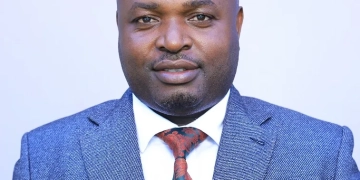
KAMPALA, Uganda — Uganda’s national helpline, a critical service for vulnerable individuals that has received over 10 billion Ugandan shillings (approximately $2.7 million USD) in partner funding over the years, is actively developing a long-term sustainability plan as donor support evolves.
John Mugisha, the National Coordinator for Sauti 116 Helpline under the Ministry of Gender, Labour and Social Development emphasized Tuesday the government’s commitment to ensuring Sauti 116 helpline’s future by integrating it into core public services.
The helpline, which supports a national call center and district-level action centers with backing from entities like UNICEF, UNFPA and UN Women, has seen a significant increase in reported cases, attributed to growing public awareness and trust. However, its reliance on donor funding has prompted a proactive approach towards financial independence.
“Currently, the Ministry of Gender, Labour and Social Development where the helpline is anchored, is developing a new strategic plan, which will encompass a sustainability plan,” Mugisha, stated during a briefing. “We’re looking at beyond the donors, we’re looking at integrating the staff.”
A key component of this strategy involves incorporating helpline personnel into the government’s established civil service structure. Mugisha explained that once the government’s ongoing rationalization process is finalized, the Ministry of Gender will assess how to gradually absorb helpline staff into its main service. The aim is that by the end of the new strategic plan’s period, all core staff will be government-funded, allowing donor contributions to be directed towards innovative projects.
“We’ll be able to see how to scale this staff into the main service, beginning gradually until the end of that strategic plan, we hope all the staff will be now being catered for by government and the donors can support the different innovations that we shall be working on, the development of different AI projects that we are working on, like the Chatbot you have heard about,” the representative added.
The government’s commitment to the helpline’s longevity is already evident in its current contributions. He highlighted that the maintenance of the national call center facility is fully funded by the government, and some staff members are already on the government payroll.
“The maintenance of this facility is all done by government. We don’t rent. This is a government facility, and some of the staff already being catered for by government. So already the process is there,” officials noted.
While acknowledging the crucial role of donor support in the helpline’s establishment and growth – from handling an initial 5-10 daily calls to the current 1,500 – the focus is now firmly on building a resilient, government-backed system.
Senior United Nations officials lauded Uganda’s collaborative and comprehensive approach to addressing violence against children and gender-based violence (GBV), highlighting the involvement of diverse stakeholders in supporting survivors.
Alison Parker, UNICEF Deputy Regional Director for Eastern and Southern Africa, commended the integrated strategy observed during a recent assessment of services.
“What struck us was the multisectoral approach to responding to violence against children and gender-based violence,” Parker said. “The involvement of various stakeholders, including the police, forensic teams, medical professionals, and the justice department, demonstrates a comprehensive understanding of the issue. This integrated approach is essential for supporting vulnerable victims, or survivors of GBV.”
Anna Mutavati, UN Women Regional Director for East and Southern Africa, also praised the evolution of the SAUTI National Helpline to address a broader range of critical issues. “Our observation of the center’s evolution from a child-focused facility to one that also addresses gender-based violence and mental health issues was truly impressive,” Mutavati noted.
She further emphasized the professionalism and expertise of the helpline staff. “The staff’s in-depth knowledge of the referral pathway and case management processes was remarkable, particularly in handling calls and subsequent investigations with support from the UN.”










Discussion about this post